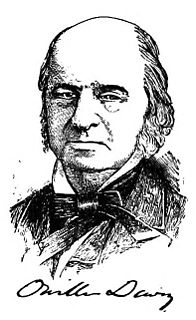A Quote by Orville Dewey
Politeness is practical Christianity.
Quote Topics
Related Quotes
We ministers have undoubtedly failed to connect and apply Christianity to the practical everyday problems of the average man. In this, we have failed to follow in Christ's footsteps. For the religion which He taught and revealed in His own life and ministry was an intensely practical and down-to-earth affair.
Bolshevism is to be reckoned with Mohammedanism rather than with Christianity and Buddhism. Christianity and Buddhism are primarily personal religions, with mystical doctrines and a love of contemplation. Mohammedanism and Bolshevism are practical, social, unspiritual, concerned to win the empire of the world.
True practical Christianity (never let it be forgotten) consists in devoting the heart and life to God; in being supremely and habitually governed by a desire to know, and a disposition to fulfill his will, and in endeavoring under the influence of these motives to 'live to his glory.' Where these essential requisites are wanting, however amiable the character may be, however creditable and respectable among men, yet, as it possesses not the grand distinguishing essence, it must not be complimented with the name of Christianity.
Through inculcating the notion that sacrifice is a virtue, Christianity has succeeded in convincing many people that misery incurred through sacrifice is a mark of virtue. Pain becomes the inignia of morality - and conversely, pleasure becomes the insignia of immorality. Christianity, therefore, does not say, "Go forth and be miserable." Rather, it says, "Go forth and practice the virtue of self-sacrifice." In practical terms, these commands are identical.
There is a reason Christianity is violently opposed in our world while other religions and philosophies are tolerated... Biblical Christianity evokes violent responses from some people, because only in Christianity is there an absolute right and wrong. People hate the Bible and Christianity because of the law of God.

































